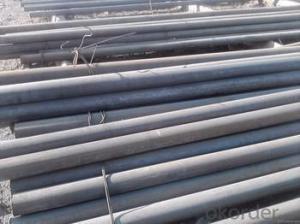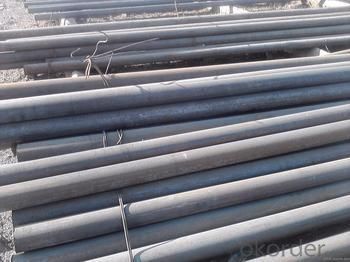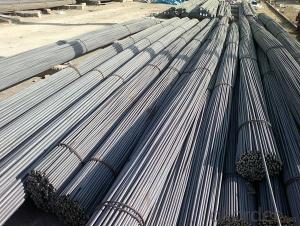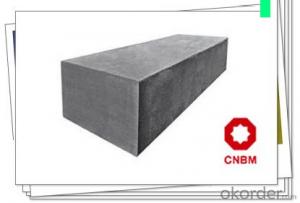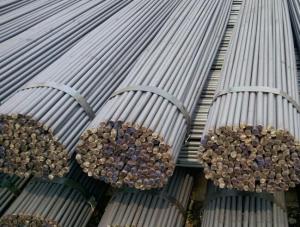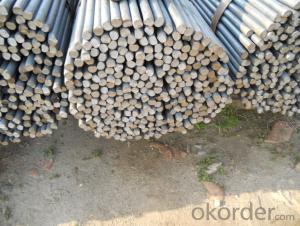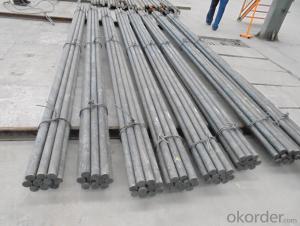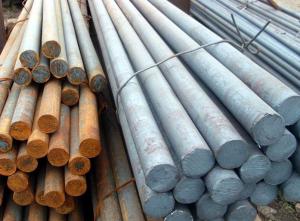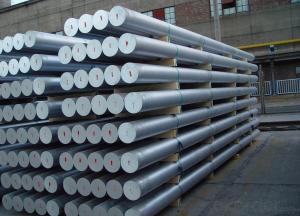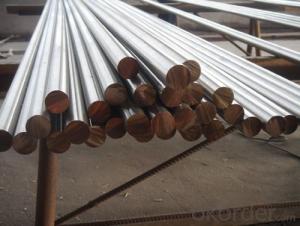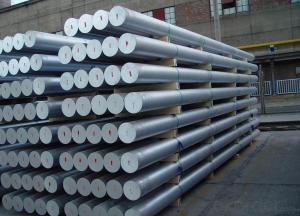Q235 size 5mm to 100mm steel round bar for construction
- Loading Port:
- Tianjin
- Payment Terms:
- TT or LC
- Min Order Qty:
- 25 m.t.
- Supply Capability:
- 100000 m.t./month
OKorder Service Pledge
OKorder Financial Service
You Might Also Like
Product Description:
OKorder is offering Q235 size 5mm to 100mm steel round bar for construction at great prices with worldwide shipping. Our supplier is a world-class manufacturer of steel, with our products utilized the world over. OKorder annually supplies products to European, North American and Asian markets. We provide quotations within 24 hours of receiving an inquiry and guarantee competitive prices.
Product Applications:
Q235 size 5mm to 100mm steel round bar are ideal for structural applications and are widely used in the construction of buildings and bridges, and the manufacturing, petrochemical, and transportation industries.
Product Advantages:
OKorder's steel round bar are durable, strong, and resist corrosion.
Main Product Features:
· Premium quality
· Prompt delivery & seaworthy packing (30 days after receiving deposit)
· Corrosion resistance
· Can be recycled and reused
· Mill test certification
· Professional Service
· Competitive pricing
Product Specifications:
1. Grade: 304, 316L, 321
2. Type: Mild carbon steel
3. Shape: Round bar, solid bar of steel with circular section
4. Diameter: 8mm-150mm
5. HS Code: 72283010
Usage and Applications of Common Steel Round Bar
1. Common Steel Round Bar of 8-25mm, or small round is mostly used for straight bundles supply, and used for steel, bolts and various mechanical parts. While the bigger round bar, or more than 25mm hot rolled bar, is mainly for the manufacture of mechanical parts or for seamless steel billet.
2. Steel round bar is used in construction and a large number of architectural and engineering structures.
3. Besides, we can supply some especial material steel round bar that can be used for main shaft of steamer, hummer shank, with big section and supper force.
Packaging & Delivery of Common Steel Round Bar
Packaging Detail: All goods are packed in bundle with steel strips and shipped by break bulk vessel or container (depend on target market and different ports)
Delivery Detail: 45 days
Trade terms: FOB, CFR, CIF
MOQ: 25 tons per specification; we can negotiate the quantity if the specification is normal or we have stock of one specification.
Weight: The price invoicing on theoretical weight basis or actual weight basis depends on customer’s request.
Shipment: The shipment of bulk break or container is depends on customer’s request and the situation of the port of destination.
Documents given: Full set of original clean on board bill of lading; Original signed commercial invoice; Original packing list; Policy of insurance; Certificate of origin and what the target market needs.
Production Flow of Common Steel Round Bar
We use advanced equipments like Electric Arc Furnace, Ladle Furnace and Vacuum Degasser to produce our products.
Material prepare (billet) — heat up — rough rolling — precision rolling — cooling — packing — storage and transportation
FAQ:
Q1: Why buy Materials & Equipment from OKorder.com?
A1: All products offered byOKorder.com are carefully selected from China's most reliable manufacturing enterprises. Through its ISO certifications, OKorder.com adheres to the highest standards and a commitment to supply chain safety and customer satisfaction.
Q5: Can stainless steel rust?
A5: Stainless does not "rust" as you think of regular steel rusting with a red oxide on the surface that flakes off. If you see red rust it is probably due to some iron particles that have contaminated the surface of the stainless steel and it is these iron particles that are rusting. Look at the source of the rusting and see if you can remove it from the surface.
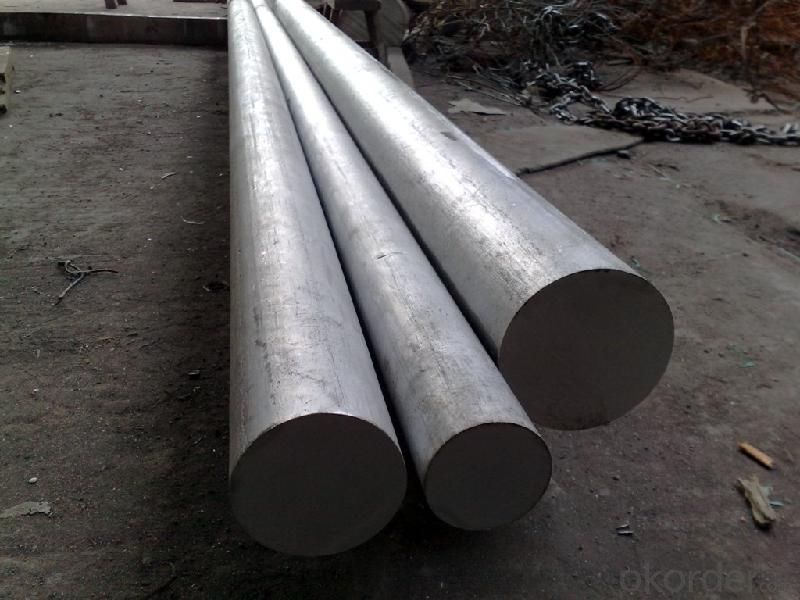
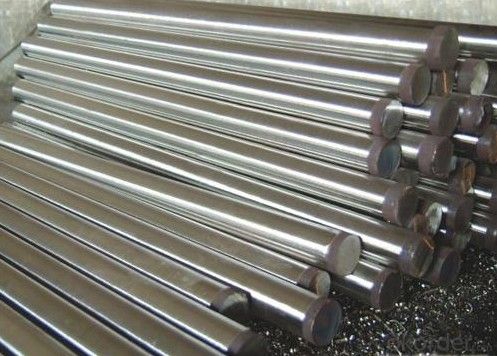
Characteristics of Common Steel Round Bar
1. The steel in which the main interstitial alloying constituent is carbon in the range of 0.12–2.0%.
2. As the carbon percentage content rises, steel has the ability to become harder and stronger through heat treating; however it becomes less ductile.
3. Quality should be in conformity with the specification of the manufacturer. Quantity and packing conditions should be in conformity with the term in the contract.
4. Regardless of the heat treatment, higher carbon content reduces weld ability. In carbon steels, the higher carbon content lowers the melting point.
- Q: Are steel round bars available in different colors?
- No, steel round bars are typically available in a silver or gray color as they are made from alloyed iron and carbon.
- Q: Are steel round bars prone to deformation?
- Steel round bars are generally not prone to deformation when they are properly manufactured and used within their intended limits. Steel is known for its high tensile strength and durability, making it resistant to bending or warping under normal circumstances. However, it is important to note that excessive force or improper handling can still cause deformation in steel round bars. Overloading, incorrect storage conditions, or inappropriate machining techniques can all contribute to bending or twisting of the bars. Therefore, it is crucial to follow recommended guidelines and industry standards to ensure the integrity and longevity of steel round bars.
- Q: 12mm Round steel, the material is Q235, the maximum weight can bear?
- The cross sectional area of 12mm steel is 3.14*36=113.04 mm, the maximum can bear much weight: 113.04*235=26564.40 cattle, is about 26.56440 kn.
- Q: How are steel round bars priced?
- Steel round bars are typically priced based on several factors. One of the key factors is the cost of raw materials, which includes the cost of steel billets or ingots used to produce the round bars. The price of these raw materials can fluctuate based on market conditions, such as supply and demand dynamics and changes in input costs. Another factor that influences the pricing of steel round bars is the manufacturing process involved. The cost of transforming raw materials into finished round bars includes expenses such as energy consumption, labor costs, and equipment maintenance. These costs can vary depending on the complexity of the manufacturing process and the efficiency of the production facilities. Market conditions also play a significant role in determining the pricing of steel round bars. Factors such as global economic trends, industry demand, and competition among suppliers can impact the market price. If there is high demand for steel round bars, manufacturers may be able to charge a premium price. Conversely, during periods of oversupply, prices may be lower as suppliers compete for customers. Additionally, the size, grade, and quality of the steel round bars can affect the pricing. Larger diameter bars or specialty grades that require additional processing steps or high-quality raw materials may be priced higher than standard sizes or lower-grade bars. Finally, transportation costs and logistics can also influence the pricing of steel round bars. Shipping distances, freight rates, and any additional handling fees can add to the overall cost of the product. In summary, the pricing of steel round bars is influenced by the cost of raw materials, the manufacturing process, market conditions, the size and grade of the bars, and transportation costs. Understanding these factors can help buyers and sellers negotiate fair prices for steel round bars.
- Q: How do steel round bars perform under torsion or twisting forces?
- Steel round bars perform very well under torsion or twisting forces due to their high tensile strength and excellent resistance to deformation. They have a strong resistance to twisting and can withstand significant torque without breaking or deforming. This makes them suitable for applications where torsional stresses are involved, such as in shafts, axles, and other mechanical components.
- Q: Can steel round bars be used for making wheel hubs?
- Yes, steel round bars can be used for making wheel hubs. Steel round bars are a common choice for manufacturing wheel hubs due to their strength and durability. The round shape of the bars allows for easy machining and shaping into the required design for the wheel hub. Steel is known for its high tensile strength and resistance to wear and tear, making it an ideal material for wheel hubs that need to withstand the heavy loads and constant rotation of the wheels. Additionally, steel is readily available and relatively cost-effective compared to other materials, making it a popular choice in the automotive industry for wheel hub production.
- Q: Can steel round bars be used in the manufacturing of bearings?
- Typically, steel round bars are not utilized in the production of bearings. Bearings necessitate materials with distinct qualities, such as exceptional strength, hardness, and resistance to wear. Steel round bars may not possess these attributes to the necessary extent. Instead, bearings are usually crafted from top-notch steel alloys that are specifically engineered for bearing purposes, such as bearing steel or stainless steel. These materials undergo specialized heat treatment procedures to attain the desired properties essential for bearing manufacturing, including the ability to bear heavy loads, minimal friction, and long-lasting endurance.
- Q: Can steel round bars be used in the chemical industry?
- Indeed, steel round bars find utility in the chemical industry. Owing to its remarkable robustness and endurance, steel is frequently favored for employment in this sector. The construction of storage tanks, pipelines, and equipment within chemical plants often involves the utilization of steel round bars. The material's resistance to corrosion renders it suitable for the handling of diverse chemicals, acids, and alkalis. Furthermore, steel round bars offer exceptional structural reinforcement, a pivotal factor in upholding the integrity and safety of chemical processes. On the whole, steel round bars are an esteemed and extensively employed substance within the realms of the chemical industry.
- Q: What are the different types of defects that can occur in steel round bars?
- Steel round bars can experience a range of defects that differ in severity and impact on overall quality and performance. Common types of defects include surface defects, internal defects, dimensional defects, decarburization, lamination, and incomplete heat treatment. Surface defects, such as scratches, pits, and scaling, are visible on the external surface of the bar. While these defects may not compromise the bar's structural integrity, they can affect its aesthetic appeal and potentially lead to corrosion if not addressed properly. Internal defects, like voids, inclusions, and segregation, occur within the body of the bar. These defects can weaken the bar's mechanical properties, jeopardize its structural integrity, and even cause cracking or failure under stress. Dimensional defects refer to variations in the size or shape of the bar, such as differences in diameter, length, or straightness. These defects can occur during manufacturing and can impact the bar's functionality and compatibility with other components. Decarburization is a defect that arises when the surface layer of the bar loses carbon due to exposure to high temperatures during manufacturing or heat treatment. This defect weakens the bar's hardness and strength, making it more susceptible to wear, fatigue, or failure. Lamination defects occur when there are layers or separations within the bar, often resulting from inadequate rolling or processing techniques. These defects reduce the bar's strength and ductility, making it prone to fracture or failure. Incomplete heat treatment can occur if the process is not performed correctly or if there are inconsistencies in cooling or reheating. This can lead to variations in hardness, strength, or toughness along the length of the bar. Manufacturers and quality control teams employ various testing and inspection methods to detect and mitigate these defects, ensuring that the bars meet the necessary standards and specifications. It is crucial to consider the specific application and requirements of the steel round bar when assessing the severity and impact of these defects.
- Q: What is the difference between a centerless ground and a hot rolled steel round bar?
- A centerless ground steel round bar and a hot rolled steel round bar are two different types of steel bars with distinct characteristics. Firstly, the manufacturing process for each type differs. A centerless ground steel round bar is produced by passing the steel bar through a centerless grinder, which removes any surface imperfections and creates a precise and smooth finish. This process ensures the bar has tight tolerances and consistent diameter throughout its length. On the other hand, a hot rolled steel round bar is created by heating the steel billet at extremely high temperatures and then rolling it through a series of mills to achieve the desired shape and size. This process results in a rougher surface finish compared to centerless ground steel bars. In terms of physical properties, centerless ground steel bars typically have a higher level of dimensional accuracy and straightness due to the precision grinding process. This makes them suitable for applications where tight tolerances and precise measurements are required, such as in the manufacturing of machinery parts or precision tools. Hot rolled steel round bars, on the other hand, are known for their strength and durability. The heating and rolling process imparts desirable mechanical properties to the steel, such as increased hardness and toughness. These bars are commonly used in general construction, structural applications, and fabrication projects where strength and reliability are crucial. In summary, the main difference between a centerless ground and a hot rolled steel round bar lies in their manufacturing processes, surface finish, and intended applications. While centerless ground bars offer superior dimensional accuracy and smoothness, hot rolled bars are valued for their strength and resilience. The choice between the two depends on the specific requirements of the application at hand.
Send your message to us
Q235 size 5mm to 100mm steel round bar for construction
- Loading Port:
- Tianjin
- Payment Terms:
- TT or LC
- Min Order Qty:
- 25 m.t.
- Supply Capability:
- 100000 m.t./month
OKorder Service Pledge
OKorder Financial Service
Similar products
Hot products
Hot Searches
Related keywords
